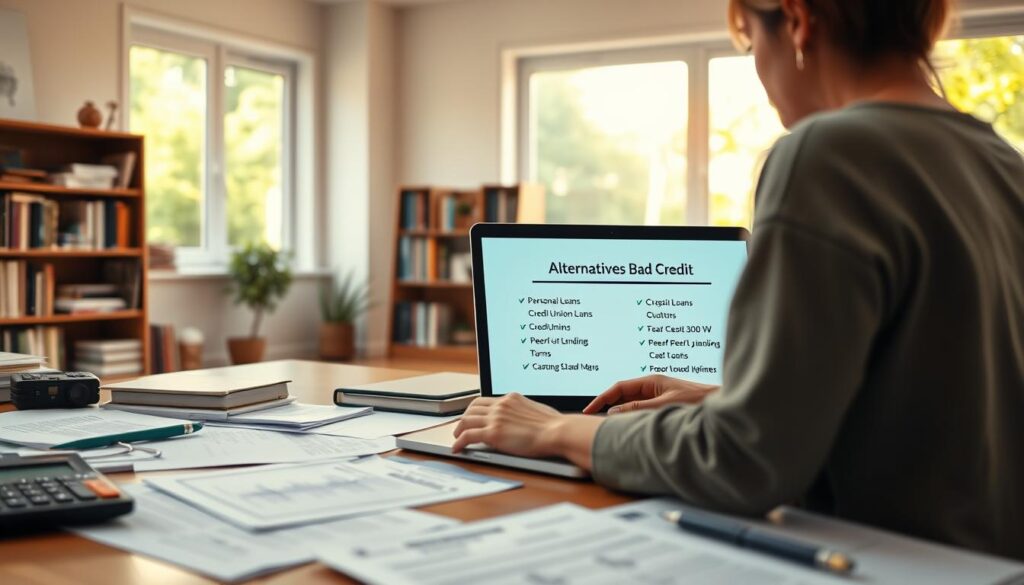Bad Credit Loans: Get the Funding You Need Today
Did you know about 77 million Americans have “poor” or “fair” credit scores? This fact shows the challenges many face in getting financial help. Bad credit loans can offer the funding needed by those with less-than-perfect credit scores. They are vital for handling emergencies, paying off debt, or buying necessary items. It caters to people needing financial help despite credit issues. With options for bad credit financing available, we can better our finances and get the funds we need.
Key Takeaways
- Bad credit loans offer essential funding for individuals with low credit scores.
- These loans help manage emergencies, consolidate debt, and finance necessary purchases.
- Understanding our options is crucial for improving financial health.
- Bad credit financing can be a stepping stone towards better credit.
- Accessible loans can aid in rebuilding our credit profiles when used responsibly.
Understanding Bad Credit Loans
Today, many people look for other ways to get a loan because of low credit scores. Bad credit loans are for these people, offering them quick money access despite poor credit. It’s key to know how these loans work to make smart financial choices.
What Are Bad Credit Loans?
Bad credit loans help those with low credit scores, usually below 580. These loans are for people seen as high-risk to lenders. They come with higher interest rates because lenders take on more risk.
How They Work
Getting bad credit loans is easier than getting traditional loans. Lenders check how much money you make more than your credit score. This way, you can get a loan even if your credit isn’t great. But, it’s important to know all about the loan terms and fees.
Who Can Benefit from Them?
Bad credit loans are helpful for those in a tight spot financially. They are good for urgent costs like doctor’s bills or fixing something urgently. Knowing about bad credit loans can help us make quick, smart money decisions when needed.
Types of Bad Credit Loans
Knowing what bad credit loans are out there helps us make smart money moves. We’ll look at personal loans, secured loans, and payday loans. Each has its own pros.
Personal Loans
Personal loans for bad credit can go from $1,000 to $50,000. They don’t need collateral. You can find different repayment options, but expect higher interest rates. Shopping around is key to find the best deal.
Secured Loans
Secured loans are another choice for bad credit scores. You’ll need something like a car or bank account as collateral. This makes interest rates lower than unsecured loans. But, don’t forget, not paying means you could lose your collateral.
Payday Loans
Payday loans are for short-term needs, usually less than $1,500. They come with big fees and interest rates. Think carefully before choosing this, as it could trap you in debt.
| Loan Type | Amount Range | Collateral Required | Interest Rate | Best For |
|---|---|---|---|---|
| Personal Loans | $1,000 – $50,000 | No | High | Flexible borrowing |
| Secured Loans | Varies | Yes | Lower than unsecured | Lower interest rates |
| Payday Loans | Up to $1,500 | No | Very high | Emergency cash |
How to Apply for Bad Credit Loans
Applying for bad credit loans is easier if we break it down into steps. This way, we’re better prepared to get the financing we need.
Application Process Overview
First, we look at different loan options and lenders. It’s important to compare their terms. Then, we fill out an online form, which asks about our money situation. Most lenders will let us know quickly if we can get the loan.
Required Documentation
When applying, we need to collect some important documents. These include an ID, proof of how much we make, and our expenses. Having these ready helps make everything go faster.
Where to Apply
Choosing where to apply for bad credit loans is important. We can choose from online lenders or credit unions. Looking into these options helps us find the best fit for our needs. For more on lenders, visit: how to apply for loans for bad.
Tips for Improving Your Chances of Approval
When you apply for loans and your credit isn’t great, you need good strategies to boost your approval chances. Taking certain steps can make you look more appealing to lenders. Here are some great ways to improve your odds when you have bad credit.
Check Your Credit Report
Start by checking your credit report. This helps find any mistakes that could hurt your score. Regularly looking at your credit report can highlight what you need to fix. It ensures you show your best financial side to lenders.
Build a Budget
Next, it’s about creating a budget. A strong budget shows you’re good with money and ready to handle debt. Aim for a debt-to-income (DTI) ratio under 36%. This means keeping track of what you earn and spend. Keeping your credit use in check can also lift your score, raising your loan approval odds.
Consider a Co-Signer
Lastly, think about getting a co-signer for your loan. A co-signer with good credit can better your chances of approval. This helps a lot, especially if your credit isn’t strong. It doesn’t just boost your approval chances. It also can get you better loan terms and lower interest rates, saving you money over time.

Interest Rates and Terms
It’s vital to know about interest rates and loan terms when looking into bad credit loans. They greatly affect our financial health and how well we can pay back the money. Knowing how to judge these can help us make smart choices about our loans.
Typical Interest Rates for Bad Credit Loans
Interest rates for bad credit loans usually range from 10% to 36%. They depend on our credit history and what the lender decides. Knowing this range is key since it impacts how much we’ll pay back in the end.
Loan Terms Explained
Loan terms are a big part of understanding bad credit loans. They can last from 12 to 60 months. A short term might mean we pay more each month, but a longer term could increase the total interest. It’s crucial to know our loan terms to manage our money well.
How to Compare Offers
We need to carefully look at offers from different lenders when we need a loan. This is very important to find the best rates for us. We should check:
- Interest rates for bad credit loans
- Loan terms
- How flexible the repayments are
- Any extra fees
Alternatives to Bad Credit Loans
Looking for finance options with a low credit score? Check out alternatives to bad credit loans. Credit unions and community banks often have better terms. Then there’s peer-to-peer lending, which connects you directly with lenders, often with fewer rules. Let’s explore these alternate financing avenues.
Credit Unions and Community Banks
Credit unions and community banks usually offer more personal service than big banks. They focus on helping the community, which often leads to lower interest rates and flexible terms. They’re also more understanding of those with low credit scores. This means they might look at your situation more kindly.
Peer-to-Peer Lending
Peer-to-peer lending is becoming popular as a fresh way to get funds. It brings borrowers and lenders together, skipping the traditional bank setup. This can mean easier credit requirements, making it a good choice for those with bad credit. Plus, you might get your money faster and at lower interest rates than standard loans.
Other Financing Options
There are more ways to get funds without high costs. Government programs and nonprofits offer help like low-interest loans, grants, or financial advice. Exploring these options can lead to smart financial solutions. This way, you can avoid expensive loans.

Understanding Loan Fees
Looking for loans with bad credit means we must understand loan fees. These fees add to the total cost of borrowing. Knowing about these fees helps us avoid surprises and make better choices.
Common Fees Associated with Bad Credit Loans
Bad credit loans come with different fees. It’s important to know these fees to avoid unexpected costs. Common fees are:
- Origination Fees: A one-time charge for processing the loan application.
- Late Payment Fees: Penalties incurred if payments are not made on time.
- Prepayment Penalties: Fees for paying off the loan early, limiting our flexibility.
Understanding the fees for bad credit loans is crucial. It helps us know the total cost of borrowing. This way, we can choose the best loan option.
How to Avoid Hidden Charges
To avoid hidden fees, we should take some steps. These steps help ensure loan agreements are clear:
- Read the Loan Agreement Carefully: Scrutinize all terms and conditions, paying extra attention to fees and penalties.
- Ask About All Potential Fees Upfront: Inquire with lenders about any ambiguous costs before finalizing loans.
- Compare Offers from Different Lenders: Diverse lenders may impose varying fees; comparing them can reveal the most favorable terms.
Managing Your Bad Credit Loan
To handle bad credit loans well, we need a good plan for paying them back. It’s important to make payments on time. Having a strong plan helps us stay on track and become more financially responsible.
Repayment Strategies
There are a few strategies to improve how we pay back loans:
- Create a budget that sets aside money for paying off loans.
- Think about using automatic payments to avoid late fees.
- Pay off loans with high interest first to save money.
- Talk to lenders for help when we’re struggling to make payments.
Importance of Timely Payments
On-time payments are crucial for managing bad credit loans. They prevent extra charges and help improve our credit score. A good credit score means better loan terms in the future, which helps us financially.
Summing up, good management of bad credit loans is based on solid payment plans and on-time payments. These habits help us be more financially sound and responsible.
The Impact of Bad Credit on Loan Options
Bad credit can really change the way we deal with money. It especially affects getting loans. If your credit score is low, banks might charge you more interest. This makes it harder to choose what’s best for our wallets. Knowing how bad credit changes loan options can help us deal with these tough spots.
How Bad Credit Affects Rates
With bad credit, we’re seen as risky by lenders. This means we get linked to higher loan rates. For instance, someone with great credit might get a 5% rate. But if your credit is not so good, you could end up paying over 20%. So, we end up paying more over time and have fewer choices because of this.
Long-Term Financial Implications
Bad credit doesn’t just affect things now. It makes borrowing expensive over time too. We can get stuck in a debt loop that’s hard to break free from. This can mess up our chances of getting good loans later. Over time, we might pay more for must-haves like a home or car. This leads to ongoing money problems.
Success Stories: Real People, Real Solutions
We’ve seen many success stories about bad credit loans changing lives during hard times. These stories of real borrowers inspire others in tough spots by showing how they found a way out. They prove that with the right approach, bad credit loans can really turn things around for the better.
Testimonials from Borrowers
Borrowers have opened up about their experiences, showing the instant and lasting help bad credit loans offer. One person was able to merge several high-interest debts into a single loan easier to manage. Another person talks about getting the money needed for crucial house repairs, making their home much better to live in. These examples highlight how well financial tools can work when used wisely.
How They Improved Their Financial Status
Getting better financially often starts with making a strong move. Borrowers have said getting a bad credit loan helped them get a grip on their money. Here are key ways they did it:
- Debt consolidation: Combining payments into one makes things less stressful and easier to handle.
- Emergency expenses: Using the loan for urgent needs prevents falling into the trap of high-cost short-term loans.
- Building credit: Paying on time improves credit scores, which can lead to more opportunities in the future.
These stories make it clear that bad credit loans can be a crucial support. They help borrowers find their footing financially and start moving towards a brighter future.
Resources for Further Assistance
When facing bad credit issues, finding helpful resources can change our financial path. There are many options designed for those needing bad credit help. With credit counseling and online tools, we get the support and advice we need.
Credit Counseling Services
Credit counseling offers strategies to understand and manage our finances better. They help us budget, pay off debts, and boost our credit scores. Many offer their help for free or a small fee, making it easy for anyone to get assistance.
Online Tools for Financial Education
Nowadays, the internet gives us access to countless financial learning tools. Through websites and apps, we can find workshops, budgeting aids, and more. These resources teach us to handle our credit wisely and make smart financial choices, leading us towards a stable financial future.









